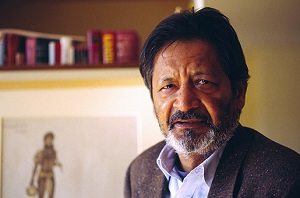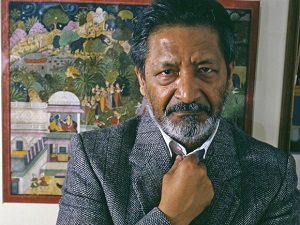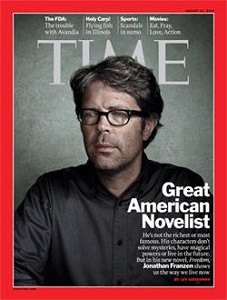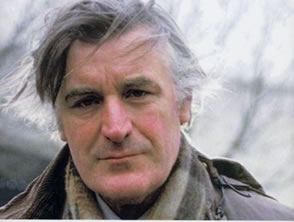De Engelse dichter en schrijver Ted Hughes werd geboren op 17 augustus 1930 in Mytholmroyd, Yorkshire. Zie ook alle tags voor Ted Hughes op dit blog.
Bride and Groom Lie Hidden for Three Days
She gives him his eyes, she found them
Among some rubble, among some beetles
He gives her her skin
He just seemed to pull it down out of the air and lay it over her
She weeps with fearfulness and astonishment
She has found his hands for him, and fitted them freshly at the wrists
They are amazed at themselves, they go feeling all over her
He has assembled her spine, he cleaned each piece carefully
And sets them in perfect order
A superhuman puzzle but he is inspired
She leans back twisting this way and that, using it and laughing
Incredulous
Now she has brought his feet, she is connecting them
So that his whole body lights up
And he has fashioned her new hips
With all fittings complete and with newly wound coils, all shiningly oiled
He is polishing every part, he himself can hardly believe it
They keep taking each other to the sun, they find they can easily
To test each new thing at each new step
And now she smoothes over him the plates of his skull
So that the joints are invisible
And now he connects her throat, her breasts and the pit of her stomach
With a single wire
She gives him his teeth, tying the the roots to the centrepin of his body
He sets the little circlets on her fingertips
She stiches his body here and there with steely purple silk
He oils the delicate cogs of her mouth
She inlays with deep cut scrolls the nape of his neck
He sinks into place the inside of her thighs
So, gasping with joy, with cries of wonderment
Like two gods of mud
Sprawling in the dirt, but with infinite care
They bring each other to perfection.
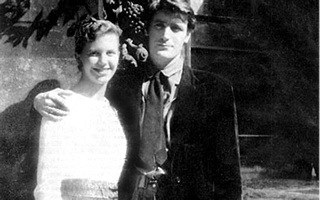
Ted Hughes (17 augustus 1930 – 28 oktober 1998)
Ted Hughes en Sylvia Plath op hun huwelijksreis in 1956
De Britse schrijver Sir Vidiadhar Surajprasad Naipaul werd geboren op 17 augustus 1932 in Chaguanas, Trinidad en Tobago. Zie ook alle tags voor V. S. Naipaul op dit blog en ook mijn blog van 17 augustus 2010.
Uit: A House for Mr. Biswas
“But the midwife said, ‘Whatever you do, this boy will eat up his own mother and father.’
The next morning, when in the bright light it seemed that all evil spirits had surely left the earth, the pundit came, a small, thin man with a sharp satirical face and a dismissing manner. Bissoondaye seated him on the string bed, from which the old man had been turned out, and told him what had happened.
‘Hm. Born in the wrong way. At midnight, you said.’
Bissoondaye had no means of telling the time, but both she and the midwife had assumed that it was midnight, the inauspicious hour.
Abruptly, as Bissoondaye sat before him with bowed and covered head, the pundit brightened, ‘Oh, well. It doesn’t matter. There are always ways and means of getting over these unhappy things.’ He undid his red bundle and took out his astrological almanac, a sheaf of loose thick leaves, long and narrow, between boards. The leaves were brown with age and their musty smell was mixed with that of the red and ochre sandalwood paste that had been spattered on them. The pundit lifted a leaf, read a little, wet his forefinger on his tongue and lifted another leaf.
At last he said, ‘First of all, the features of this unfortunate boy. He will have good teeth but they will be rather wide, and there will be spaces between them. I suppose you know what that means. The boy will be a lecher and a spendthrift. Possibly a liar as well. It is hard to be sure about those gaps between the teeth. They might mean only one of those things or they might mean all three.’
‘What about the six fingers, pundit?’
‘That’s a shocking sign, of course. The only thing I can advise is to keep him away from trees and water. Particularly water.’
‘Never bath him?’
‘I don’t mean exactly that.’ He raised his right hand, bunched the fingers and, with his head on one side, said slowly, ‘One has to interpret what the book says.’ He tapped the wobbly almanac with his left hand. ‘And when the book says water, I think it means water in its natural form.’
‘Natural form.’
‘Natural form,’ the pundit repeated, but uncertainly. ‘I mean,’ he said quickly, and with some annoyance, ‘keep him away from rivers and ponds. And of course the sea. And another thing,’ He added with satisfaction. ‘He will have an unlucky sneeze.’ He began to pack the long leaves of his almanac. ‘Much of the evil this boy will undoubtedly bring will be mitigated if his father is forbidden to see him for twenty-one days.’

V. S. Naipaul (Chaganuas, 17 augustus 1932)
Cover
De Duitse schrijver en theatermaker Nis-Momme Stockmann werd geboren op 17 augustus 1981 in Wyk auf Föhr. Zie ook alle tags voor Nis-Momme Stockmann op dit blog.
Uit: Der Fuchs
„Katastrophe“ – das bedeutete, auf dem Sofa wegnickend BBC Reportern dabei zuzusehen, wie sie mit Helikoptern über landkartenartig fern erscheinende Erdbebengebiete flogen, während der Rippenbraten in der Röhre langsam anfing, lecker zu riechen. «Katastrophe» – das war das, was als aufgeschlagene Zeitung im Geräteschuppen lag und worüber man «Hast du schon mitgekriegt? Was für eine Scheiße» zu seinem Nachbarn sagte, bevor man auf den Rasentraktor stieg –
Aber jetzt standen die Menschen auf den Dächern und warteten auf Rettung, während tote Senioren und Tiere wie graues Obst in den umspülten Baumkronen hingen und Vögel an ihren Augen pickten. Kinder weinten in der Ferne. Hunde bellten ertrinkend.
Über Nacht war das Wasser gestiegen, was an sich schon ungewöhnlich war und niemand hier jemals erlebt hatte*. Niemand hatte jemals eine Katastrophenübung mitgemacht, es gab keine Signalraketen, keine Rettungswesten, keine Dieselgeneratoren, keine Besenkammern voll mit Notkonserven, keine Telefonnummern, die man laminiert und neben das Telefon geklebt hätte, keine Funkgeräte, keine Thermodecken – ja noch nicht mal Worte gab es in den Köpfen der Menschen hier für all das. Also brach irgendwann am frühen Morgen offenbar der Deich, und das Wasser rollte – wie eine große geduldige Verarschung – über den Ort, ohne dass auch nur eine Sirene losging.
Jetzt war es später Nachmittag, und wir standen zu dritt bei Baumann (den alle nur Dogge nannten) auf dem Dach und tranken wartend Bier aus der einzigen Notfallkiste des Dorfes, während die Welt nur noch aus schmutzigem Wasser zu bestehen schien.
Einen knappen Meter unter uns schwamm all das vorbei, was Stunden zuvor noch sortiert und sauber in Gärten und Wohnungen gestanden hatte: Klimageräte, Billardqueues, Wasserpumpen von Aufstellpools. Bei den Gedels floss die Garderobe aus dem Fenster – es sah aus, als würde sich das Haus übergeben. Ich kniff meine Augen zusammen:
Da unten fraß sich das Lacostekrokodil mit winzigen Bissen in ein Polohemd. Durch die Hauptstraße zogen Delfinschwärme aus Plastik. Aufgeblähte Hemden flatterten im Wind. Sporttrophäen glänzten wie geheime Schätze auf dem Grund der braunen Soße, an ihrem Sockel lösten sich die blechernen Plaketten ab –
All das teure Zeug war innerhalb von Stunden zu Müll geworden.“

Nis-Momme Stockmann (Wyk, 17 augustus 1981)
De Amerikaanse schrijver en essayist Jonathan Franzen werd geboren op 17 augustus 1959 in Western Springs, Illinois. Zie ook alle tags voor Jonathan Franzen op dit blog en ook mijn blog van 17 augustus 2010.
Uit: De correcties (Vertaald door Marian Lameris, Gerda Baardman en Huub Groeneweg)
“De razernij van een najaarskoufront dat van de prairie komt. Je kon het voelen: er ging iets verschrikkelijks gebeuren. De zon laag aan de hemel, een klein licht, een afkoelende ster. De ene vlaag van wanorde na de andere. De bomen rusteloos, de temperaturen dalend, de hele noordelijke religie van de dingen ten einde lopend. Hier geen kinderen in de tuinen. De schaduwen lengden over geel wordende gazons. Amerikaanse eiken en moeraseiken regenden eikels op huizen zonder hypotheek. Voorzetramen klapperden in de lege slaapkamers. En het zoemen en hikken van een wasdroger, het nasale betoog van een bladblazer, het rijpen van net geplukte appels in een papieren zak, de lucht van terpentine waarmee Alfred Lambert de verfkwast had schoongemaakt nadat hij die ochtend bezig was geweest het rieten bankje te verven.
Drie uur ‘s middags was een tijd van gevaar in deze gerontocratische buitenwijken van St. Jude. Alfred was wakker geworden in de enorme blauwe stoel waarin hij vanaf de lunch had geslapen. Hij had zijn dutje gedaan en tot vijf uur zou er geen plaatselijk nieuws zijn. Twee lege uren waren een holte waarin infecties de kop opstaken. Hij kwam moeizaam overeind en ging bij de pingpongtafel staan, vergeefs luisterend of hij Enid hoorde.
Door het hele huis klonk een alarmbel die alleen Alfred en Enid rechtstreeks konden horen. Het was de alarmbel van de angst. Hij leek op zo’n grote gietijzeren schaal met een elektrische klepel die schoolkinderen bij brandoefeningen de straat op jaagt. Hij luidde nu al zo veel uren dat de Lamberts de boodschap ‘bel gaat’ niet meer hoorden, maar zoals het gaat met alle klanken die zo lang doorgaan dat je tijd genoeg hebt om de samenstellende klanken te gaan onderscheiden (net als met woorden waarnaar je staart tot ze uiteenvallen in een rij dode letters), hoorden ze alleen een klepel die snel tegen een metalen resonator sloeg, geen zuivere toon maar een korrelige opeenvolging van slagen met een weeklagende bovenlaag van boventonen;…”
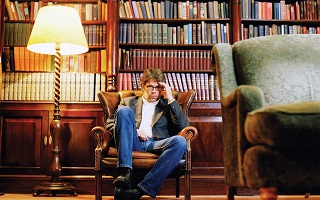
Jonathan Franzen (Western Springs, 17 augustus 1959)
De Duitse schrijfster Herta Müller werd geboren op 17 augustus 1953 in Nitzkydorf, Roemenië. Zie ook alle tags voor Herta Müller op dit blog en ook mijn blog van 17 augustus 2010.
Uit: Atemschaukel
“Und in der Lagerzeit – im Lager erwischt, war ich tot gewesen.
Ich streifte nach den fünf Lagerjahren Tag für Tag durch den Tumult der Straßen und übte im Kopf die besten Sätze für den Fall meiner Verhaftung: AUF FRISCHER TAT ERTAPPT – gegen diesen Schuldspruch habe ich mir tausend Ausreden und Alibis zurechtgelegt. Ich trage stilles Gepäck. Ich habe mich so tief und so lang ins Schweigen gepackt, ich kann mich in Worten nie auspacken.
Ich packe mich nur anders ein, wenn ich rede.
Im letzten Rendezvous-Sommer bin ich, um den Heimweg aus dem Erlenpark zu verlängern, auf dem Großen Ring zufällig in die Kirche der Heiligen Dreifaltigkeit gegangen. Dieser Zufall spielte Schicksal.
Ich habe die kommende Zeit gesehen. Neben dem Seitenaltar auf einer Säule stand der Heilige im grauen Mantel und trug als Mantelkragen ein Schaf im Nacken. Dieses Schaf im Nacken ist das Schweigen. Es gibt Dinge, über die man nicht spricht. Aber ich weiß, wovon ich rede, wenn ich sage, das Schweigen im Nacken ist etwas anderes als das Schweigen im Mund.
Vor, während und nach meiner Lagerzeit, fünfundzwanzig Jahre lang habe ich in Furcht gelebt, vor dem Staat und vor der Familie. Vor dem doppelten Absturz, dass der Staat mich als Verbrecher einsperrt und die Familie mich als Schande ausschließt. Im Gewühl der Straßen habe ich in die Spiegel der Vitrinen, Straßenbahn- und Häuserfenster, Springbrunnen und Pfützen geschaut, ungläubig, ob ich nicht doch durchsichtig bin.
Mein Vater war Zeichenlehrer. Und ich, mit dem Neptunbad im Kopf, zuckte wie von einem Fußtritt zusammen, wenn er das Wort AQUARELL benutzte. Das Wort wusste, wie weit ich schon gegangen war. Meine Mutter sagte bei Tisch: Stich die Kartoffel nicht mit der Gabel an, sie fällt auseinander, nimm den Löffel, die Gabel nimmt man fürs Fleisch. Mir pochten die Schläfen. Wieso redet sie vom Fleisch, wenn es um Kartoffel und Gabel geht. Von welchem Fleisch spricht sie. Mir hatten die Rendezvous das Fleisch umgedreht. Ich war mein eigener Dieb, die Wörter fielen unverhofft und erwischten mich.“
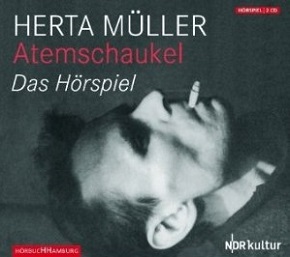
Herta Müller (Nitzkydorf, 17 augustus 1953)
Cover
De Ethiopische dichter en schrijver Tsegaye Gabre-Medhin werd geboren op 17 augustus 1936 in Boda bij Ambo. Zie ook alle tags voor Tsegaye Gabre-Medhin op dit blog en ook mijn blog van 17 augustus 2010.
Guilty?
On the grave of my friend, I stood.
For blood and flesh, I stayed . . .
And with faith I prayed, and prayed;
For blood and flesh, he was robed . . .
And with doubt, I hoped, and I hoped.
On the grave of my friend, as I stayed;
… On my future, I brood .
I stood on the grave of a man.
A tomb-stone of a man, I burdened.
The grave of a man, I murdered:
And with hope, my future, I sketched,
When with prayer, my killer hand, I stretched.
On the tomb-stone, of the man, I murdered:
. . . Urrahh!!! I won!
On my victim’s carcass, I climb.
While on his tomb, I tread …
My bloody fingers, I spread:
Thus to repent, to justify, I have tried …
While I hoped, and prayed, I have cried.
And I won, my daily wine, and bread!
… Is it a crime?
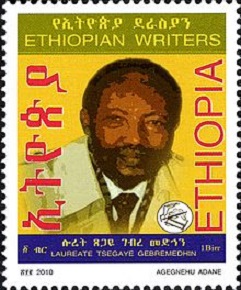
Tsegaye Gabre-Medhin (17 augustus 1936 – 25 februari 2006)
De Franse schrijver en diplomaat Roger Peyrefitte werd geboren op 17 augustus 1907 in Castres. Zie ook alle tags voor Roger Peyrefitte op dit blog en ook mijn blog van 17 augustus 2010.
Uit: Our Love (Vertaald doorJohn Stefan)
“This detail touched me. What dramas would be avoided with a little bit of common sense!’ I shook my head approvingly. However, the love of smoking was not always to blame for the special friendships. On the road, I told my friend the recent tragedy about which a young man from Bretagne had informed me and who, having had a natural college as a theatre, clergymen as artisans and a child as a victim, reminded me of the story that I had romanticized. But probably one is more capable in a college at the Ile-de-France, where there is the permission to smoke.
The first leaves unfolded themselves on the branches, the sun mohaired the water piece, the breeze brought us the scent of youth and of hope. I retraced my footsteps to the court: I liked to confirm the significance of a look and to show that I understood. Wasn’t the sound of the bell going to abolish my calculations? Down there, the silhouette in the red sweater stood out. I quickened my steps, though the conversation rolled on about Teilhard de Chardin. My friend’s son came back towards us. The other one was seen in front, leaning against a tree, always his hands in his pockets. His green look seized me with the same force. A hidden joy floated from it: he had received my answer.
During the return, my excitement amused my friend. To him it seemed justified by this visit, made at the risk of a walk. Despite our intimacy, I could not admit to him that I had decided upon a friend of his son. How many novels of this genre had I lived in some minutes or in some hours! But, most often, this look, which established a complicity between a man and a boy, has as a comment the English sonnet “Lost opportunities”: “My name is What could have been. My names are also Never again, Too late, Goodbye.” If I believed in the reality of the novel today, it is because I never captured a look like that: it was not the one of opportunity, but of fate.
I did not forget the abyss that separated me from an unknown boy, detained in a college. However, a chance remained to see him again. I owed it to the headmaster, just like I owed him this encounter: he had suggested me to assist at Mass next Tuesday. ‘There also, we have changed a lot of things,’ he had said to me. ‘The religious methods of your youth – and mine – were miserable, and I am not surprised that they often produced the opposite effect of what people were looking for.”
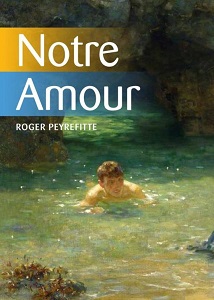
Roger Peyrefitte (17 augustus 1907 – 5 november 2000)
Cover Franse uitgave
De Nederlandse dichter en schilder Hendrik de Vries werd geboren in Groningen op 17 augustus 1896. Zie ook alle tags voor Hendrik de Vries op dit blog.
Een Spaans volkslied
In de gezegende dagen
Van jubelen en van bloeien
Wanneer de hartstochten schroeien
En hun dorst naar de lippen slaat,
Wordt soms ons geluk door vlagen
Van sombre weedom verdorven:
Dat zijn liefden, lang gestorven,
Die beschuldigen van verraad.
De drift vervliegt als een rukwind,
Het genot blijft nauwelijks heugen,
Wat wellust heet, is een leugen,
De schoonheid een ijdel mom;
De mens, die nergens geluk vindt,
Raakt vermoeid en afgezworven;
Naar liefden, voorlang gestorven,
Gaan dan zijn wegen weerom.
Mijn broer
Mijn broer, gij leed
Een einde, waar geen mens van weet.
Vaak ligt gij naast mij, vaag, en ik
Begrijp het slecht, en tast en schrik.
De weg met iepen liep gij langs.
De vogels riepen laat. Iets bangs
Vervolgde ons beiden. Toch wou gij
Alleen gaan door de woestenij.
Wij sliepen deze nacht weer saam.
Uw hart sloeg naast mij. ‘k Sprak uw naam
En vroeg, waarheen gij ging.
Het antwoord was:
‘Te vreselijk om zich in te verdiepen.
Zie: ’t gras
Ligt weder dicht met iepen
Omkringd.’
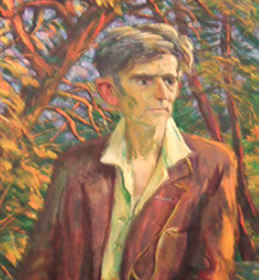
Hendrik de Vries (17 augustus 1896 – 18 november 1989
Portret door Johan Dijkstra, 1960 (detail)
Zie voor nog meer schrijvers van de 17e augustus ook mijn blog van 17 augustus 2014 deel 2.

